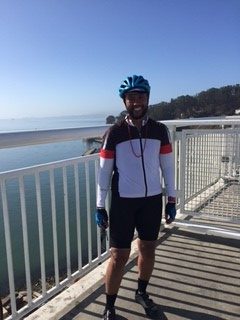Since skin cancer is the world’s most common cancer, it goes without saying that it affects people all around the world. What is less obvious, however, is that anyone regardless of age, skin tone or race can develop the disease. It’s true that people with darker skin tones have more melanin, the natural pigment that gives their skin some protection against sun damage. This only helps to a certain extent, though: People of color are not immune to skin cancer. Stacy Jackson discovered this at age 58 when his dermatologist informed him he had a basal cell carcinoma (BCC) on the back of his head.

Since his diagnosis, Jackson practices a complete sun protection regimen which includes UV-protective clothing.
Jackson recalls that he had not even made the appointment specifically to get the spot checked out — he was visiting the dermatologist for an unrelated reason, and figured he should mention the spot. He remembered that his barber had suggested he get the bump, which occasionally bled, checked out. The dermatologist removed some tissue from the spot to do a biopsy, and later called to tell him the spot was skin cancer.
“I was shocked,” Jackson says. “I thought it was a pimple. I would pick at it, but it would always come back.”
Jackson may have been surprised by the diagnosis, but it could have happened to anyone whose skin had sustained sun damage. Jackson grew up in sunny Southern California, and remembers frequent trips to Santa Monica beach as a child. Even away from the beach he was active outdoors, swimming and riding his bike. Sun protection wasn’t a part of the equation.
“I don’t recall ever using sunscreen as a kid,” he says.
Basal cell carcinomas are usually caused by a combination of cumulative everyday sun exposure and occasional intense sun exposure. There are several treatment options for BCCs, but Jackson had his tumor removed through Mohs surgery, a technique where the visible tumor is removed (excised) and examined under a microscope. If the margins of the excised tissue are clear of cancer, the procedure ends. If not, another layer of tissue is removed, and the procedure is repeated until the margins are clear.
The procedure took time, but it did do the job — Jackson has been cancer-free since the surgery. This may be in part due to his new efforts to protect himself from the sun’s rays. Immediately after having his cancer removed, Jackson made changes to lower his risk of recurrence.
“I found a sunscreen that I could wear every day,” he says. “I do wear a hat, and I bought UV-protective clothing for when I ride my bike.”
Unfortunately, many people of color may not be taking these kinds of precautions. In a 2010 survey, 63 percent of Black Americans surveyed said they never used sunscreen — a possible result of misconceptions concerning who can develop skin cancer. Jackson said it’s important not to assume that just because you have more melanin means you’re completely protected from skin cancer.
“That myth needs to be busted,” he says. “We all need to protect ourselves against the sun, particularly if we’re active outdoors. We are all susceptible [to skin cancer], and need to be cognizant of that.”





